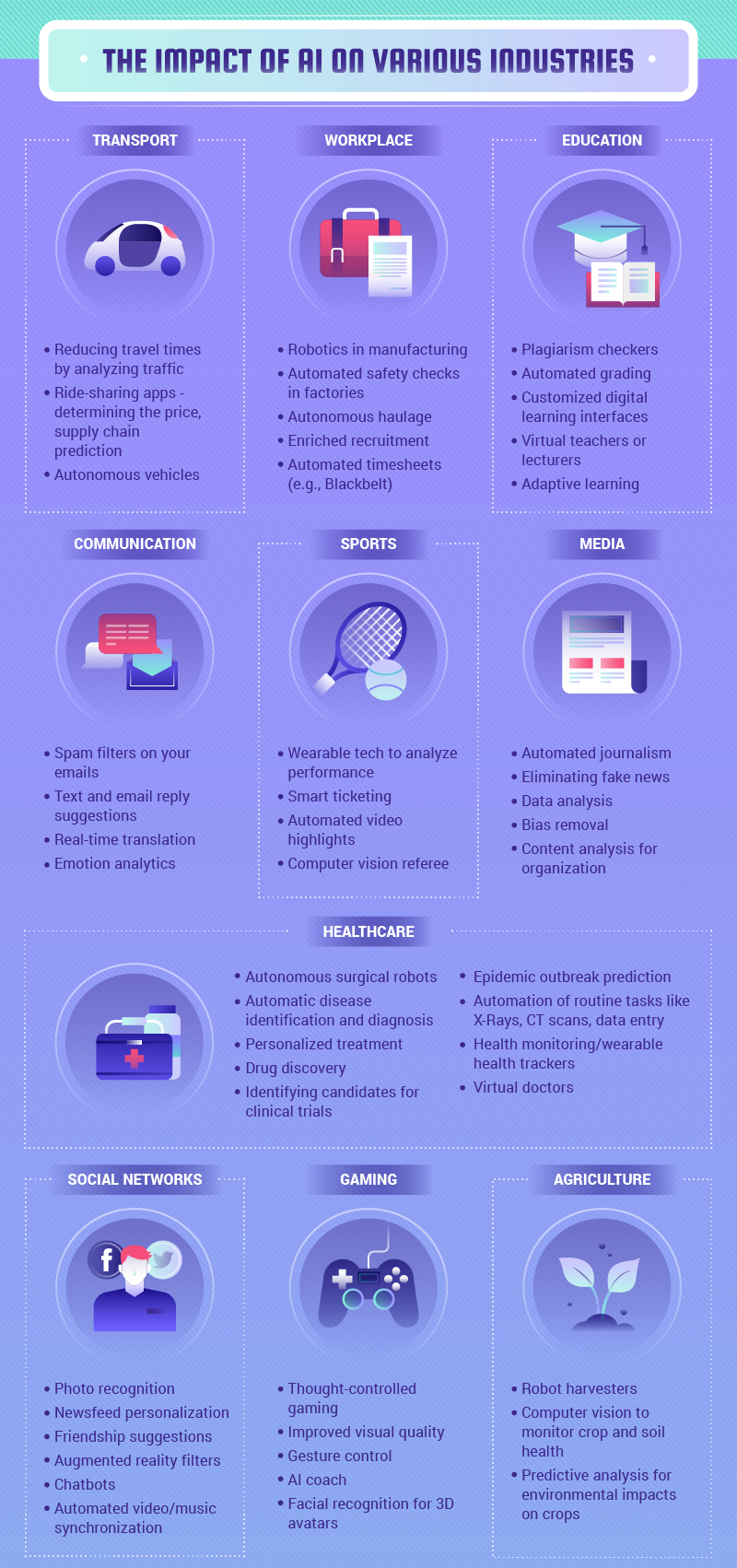The field of artificial intelligence has come a long way since 1943 when Turing’s test was conceived. Once a concept relegated only to science fiction, artificial intelligence is slowly but surely climbing its way out of the world of fantasy and into our daily lives. And we’re much closer to this fictional technology than many realize — we are now taking the first steps towards true AI.
As one may guess, interest in artificial intelligence is extremely high. Some predictions claim that by 2020, the worth of the artificial intelligence industry will go well beyond one trillion dollar mark. Even at its developmental stage, AI is already turning industries left and right on their heads, as they keep finding new ways to use it to improve facets of their business models.
Artificial inteligence use cases
So where would artificial intelligence prove the most useful? To be sure, its applications are many, but it’s most at work where there’s a lot of numbers to crunch and a lot of information to sort. Finance, transportation, education – these and many more stand to benefit from AI implementation.
Needless to say, marketing is no exception to this rule. Like every industry, marketing has its share of problems it encounters on a regular basis. Some aspects of the marketing business can make it slow and ineffective. One example is its use of massive amounts of data.
Artificial intelligence and marketing
It’s no secret that marketing involves collecting massive amounts of data. This is mainly data about various demographics marketing experts need to connect to the right audience.
So much data is in use, in fact, that over 60% of marketers feel that it’s too much data for them to handle. Perhaps even worse, over 80% of them believe that they cannot fully use the data they have collected.
You would probably agree that no company likes having data going down the drain, which is why they are all keen to find better ways of utilizing the information they possess. Human labor doesn’t quite do it, though — it’s a lot of data we’re talking about.
Someone has to go through all this information gathered over a long period of time, after all. Typically, it’s a taxing job for us to endure, making the process somewhat sluggish.
Artificial intelligence, however, doesn’t mind trudging through the data. It doesn’t get tired, nor does it get bored — it only gets the job done. And it’s good at what it does. In fact, it’s unimaginably good at it, and it completes tasks much faster and with more accuracy than we can ever hope to do by ourselves.
Not only can it process thousands of stats and numbers per second, but it can also segment it in the most optimal way for your business goals, and spot or predict useful trends.
Perhaps best of all is that artificial intelligence only gets better at its job.
There’s a concept in AI called machine learning. The idea is that artificial intelligence can learn from the data we present it. After a while, it gets better at doing whatever it needs to do with this data. It improves exponentially, so it can become much better awfully fast.
Introducing artificial intelligence technology in the marketing sphere can yield amazing benefits, and it would only help more as time goes by. Once an AI-powered machine or a system completes an action, it tries to find a more efficient way to do it again in the future.
Essentially, you get a worker who only improves, never eats or sleeps, and can do the work of an entire team on its own.
There’s no denying the power AI has to greatly boost industry productivity, especially of those sectors that deal with big data on a regular basis. With the implementation of this exciting new technology, the marketing sector can expect a major increase in effectiveness in the future.
Are you interested in learning more?
This amazing infographic below brought to us by TechJury will give you a better idea of just how deep of an impact AI has and will have on various industries, as well as our society at large.
You’ll also get a crash course in the history of artificial intelligence, some useful definitions, and a stats-based depiction of its effect on the world. All that and more in a simple, sleek looking infographic.
Check out a snippet below.

Want to find out more use cases for artificial intelligence in marketing? Check out this article about smart content.

